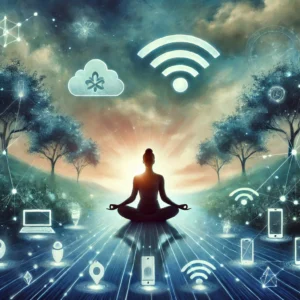Mental Health and Mindfulness in a Digital World: Protecting Your Well-Being in 2024
In today’s world, the need for mental health and mindfulness has become more urgent than ever. Technology is woven into the fabric of our daily lives—whether we’re working, socializing, or relaxing, it’s often done through a screen. While it provides countless conveniences, this constant connectivity also poses real challenges to our mental well-being. Too much screen time, social media pressure, and a lack of balance can lead to feelings of anxiety, burnout, and stress.
Thankfully, mindfulness offers a simple yet powerful way to counteract the negative effects of living in a digital world. But first, let’s explore how the digital age is impacting mental health and what we can do to navigate it more mindfully.
How the Digital World Affects Mental Health
We live in an era where the average person spends a significant portion of their day staring at a screen—whether it’s a smartphone, tablet, or computer. It’s easy to get caught in the endless loop of checking notifications, scrolling through social media, and juggling multiple apps at once. While all this technology keeps us connected and informed, it also overloads our brains and, in some cases, negatively affects our mental health.
1. Digital Overload
Have you ever felt overwhelmed by the sheer volume of notifications you receive in a day? Between work emails, social media alerts, and news updates, we are constantly bombarded with information. This non-stop flow can lead to what’s known as decision fatigue—a mental exhaustion that stems from making too many decisions or processing too much data at once. Over time, this overload can elevate stress levels and make it difficult to focus on the things that truly matter.
2. Social Media Comparisons
The pressure of social media can also harm our mental health. Scrolling through endless streams of perfectly curated photos and updates from others often leads to comparison. We start to question our own lives, wondering why we don’t have the perfect vacation, the picture-perfect relationship, or the most impressive career. While social media connects us, it can also cause feelings of inadequacy, jealousy, and even loneliness. Over time, this can chip away at our self-esteem.
3. Screen Time and Sleep
Another significant way the digital world affects mental health is by interfering with sleep. Whether it’s late-night binge-watching or doomscrolling on social media, prolonged screen exposure can seriously disrupt sleep patterns. The blue light emitted by devices interferes with melatonin production—the hormone responsible for regulating sleep. Poor sleep can have a ripple effect on mental health, making you more prone to mood swings, anxiety, and a lack of focus during the day.
What is Mindfulness, and Why is It Important in the Digital World?
Mindfulness is a practice that involves paying full attention to the present moment—your thoughts, emotions, and surroundings—without judgment. Instead of getting swept up in the distractions around you, mindfulness teaches you to focus on what’s happening right now. It’s about slowing down, becoming more aware of your mental state, and letting go of constant worry about the future or the past.
When applied in our digital lives, mindfulness can help us create healthy boundaries with technology. It encourages us to recognize when we’re overstimulated and take a step back before the stress becomes overwhelming. More than that, it can help us break the cycle of social media comparison, digital multitasking, and mindless scrolling.
How Mindfulness Can Improve Mental Health in the Digital Age
Here’s how mindfulness can support your mental health in an increasingly digital world:
1. Combat Digital Overload
Mindfulness helps you become more aware of when your mind is overstimulated. By practicing being present, you’ll be able to recognize the need for digital breaks and moments of quiet. Something as simple as a mindful pause before responding to an email or notification can drastically reduce stress and decision fatigue.
2. Overcome Social Media Pressure
It’s easy to compare ourselves to others, especially when social media often shows only the highlights of people’s lives. Mindfulness teaches us to be content in our own journey, appreciating what we have rather than constantly striving for perfection. With mindfulness, you can shift from comparing yourself to celebrating others without negatively affecting your own self-esteem.
3. Boost Focus and Productivity
We live in a world where multitasking is the norm, but it’s often counterproductive. Mindfulness encourages single-tasking—focusing on one thing at a time, without switching back and forth between tabs or apps. This can increase both productivity and mental clarity, reducing the cognitive overload that often comes with digital multitasking.
4. Improve Sleep Quality
Mindfulness techniques like guided breathing or meditation before bed can help calm a racing mind, allowing you to relax and fall asleep more easily. By creating a mindful evening routine, you can reduce the negative effects of late-night screen use and improve your overall sleep hygiene.
5 Practical Mindfulness Tips for Managing Your Mental Health in a Digital World
Now that we’ve discussed the importance of mindfulness, let’s dive into some actionable steps you can take today to start practicing mindfulness and improving your mental well-being:
1. Mindful Breathing
Mindful breathing is one of the easiest ways to practice mindfulness, and you can do it anywhere. Start by taking a deep breath in through your nose for a count of four, hold for four seconds, and exhale slowly for another count of four. Repeat this for a few minutes whenever you feel stressed or anxious. Focusing on your breath helps calm your mind and brings you back to the present.
2. Schedule Digital Detox Times
Set aside specific periods during the day to be completely disconnected from technology. This could be during meals, while reading, or an hour before bed. Use this time to engage in activities that don’t involve screens, such as journaling, meditating, or spending time outdoors. Regular digital detox breaks help refresh your mind and prevent burnout from constant digital stimulation.
3. Practice a Body Scan Meditation
A body scan meditation is a fantastic way to tune into your physical state and relax tense muscles. Start from your toes and work your way up to your head, paying close attention to how each part of your body feels. If you notice any tension, consciously relax those muscles. This practice is especially helpful after a long day of sitting at a desk or staring at a screen.
4. Embrace Single-Tasking
Multitasking may feel productive, but it often splits our attention and causes us to feel more overwhelmed. Try embracing single-tasking instead. Focus on one task at a time, whether it’s writing an email or reading an article. You’ll notice that you feel less mentally drained and more accomplished.
5. Use Social Media Mindfully
Before opening social media, set an intention. Are you logging on to connect with friends, learn something new, or just to pass the time? By being mindful of your social media usage, you can avoid falling into the trap of mindless scrolling and stay focused on what’s meaningful to you.
Finding Balance in 2024
As we move deeper into 2024, the balance between our digital and mental health is more crucial than ever. Here are a few additional tips to maintain a healthy relationship with technology:
- Set Clear Boundaries: Designate tech-free zones or times, such as during meals or an hour before bed.
- Reduce Digital Clutter: Keep only the apps that add real value to your life, and turn off unnecessary notifications.
- Prioritize Self-Check-ins: Take time every day to assess how you’re feeling emotionally. Regular self-reflection can prevent mental burnout and help you take action before stress becomes overwhelming.
- Seek Help When Needed: Don’t be afraid to reach out to a mental health professional if you’re struggling to manage digital stress. Sometimes, guidance from a therapist can make all the difference.
Conclusion
Prioritizing mental health and mindfulness is essential for maintaining well-being in the digital age. By adopting mindfulness practices and setting healthier boundaries with technology, you can protect your mental health and create a more balanced, fulfilling life in 2024. Remember, mindfulness is not about being perfect—it’s about taking small, intentional steps to stay present and grounded, no matter how connected the world becomes.
Start today with mindful breathing or a digital detox and notice the positive impact it has on your mental health!

